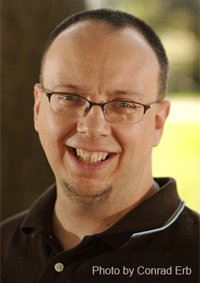Stephen Kriss
skriss@mosaicmennonites.org
 Gulf States Mennonite Conference leader Steve Cheramie-Risingsun said last month at Deep Run East that the church needs Franconia Conference congregations to be strong and healthy. He said that in native tradition the strong, straight trees growing around Deep Run’s meetinghouse suggested good earth and good care-taking.
Gulf States Mennonite Conference leader Steve Cheramie-Risingsun said last month at Deep Run East that the church needs Franconia Conference congregations to be strong and healthy. He said that in native tradition the strong, straight trees growing around Deep Run’s meetinghouse suggested good earth and good care-taking.
Steve’s assertion and observation made me ask questions. What does it mean for congregations to be strong and healthy? How is that achieved or maintained? How do centuries old communities remain healthy and strong rather than fragile and disintegrating? What does it mean to be strong, well stewarded and rooted in good earth?
Strong and healthy congregations are careful about what they consume and what consumes them. We live in an age of buffets (both China Wok and Shady Maple) with so much food in the offing that we can easily overeat and ingest more resources than necessary. Consuming too much makes it difficult to move quickly and stresses our bodies. We live in an age of access to information and images that enables us to graze and gaze in ways we never could before. This access can move us into a stupefying information overload in which we confuse knowing, caring, and acting. We even become consumers of the most holy actions – service, worship, learning, travel, rest – which rather than bring us closer to God serve to disconnect, disengage, and disenchant.
Strong and healthy congregations stretch while strengthening their core. I took a pilates class once and the instructor insisted that the body’s core is strengthened through sometimes painful and awkward stretching. The instructor said the body’s core bears much of the ability to move and to deal with tension. Jeanette Baum writes about Deep Run East’s experience building a home for “Shelter of Life†which led to Steve Cheramie-Risingsun’s visit which led to an article in the Allentown Morning Call and regional Native leaders visiting the congregation. In strengthening a core of service in the name of Christ, the church is being stretched in unexpected ways.
Strong and healthy congregations develop relationships that result in new commitments and growth. In Blaine Detwiler’s encounter with Anabaptists in the United Kingdom, we witness a challenging and hopeful emerging relationship. What does it mean for the Western Hemisphere’s oldest Mennonite community to learn from new Anabaptists across the pond?
Could these new relationships and fresh commitments inspire us to create communities that might look radically different from our historic realities? Could the British perspective provide a path for new generations to embrace Anabaptism in a postmodern, global information age? Both the Franconia congregation and Philadelphia Praise Center are building new relationships with Spanish-speakers in their settings. These possibilities have grown from Franconia Conference relationships in Mexico. What commitments will
emerge as these relationships grow?
Strong and healthy congregations train and practice in preparation for witness, response and decision-making. As followers of Jesus, we train and practice our actions in community. Training and practice builds strength and capacity for public witness and response. We sing and pray together. We listen and study together. We eat, laugh, disagree and cry. We wash each other’s feet both literally and figuratively. We share our questions, doubts and possessions. We practice the faith so that we are fully prepared to give witness to the nonviolent way of Christ relevantly and redemptively. According to Mennonite Weekly Review, the top media stories about Mennonite life in 2006 were related to radical forgiveness (the Amish at Nickel Mines and the holding of Christian Peacemaker Team members in Iraq). These moments of profound public witness are rooted in practiced shared action and commitment.
Menno Simons would suggest that strong and healthy congregations are active and cannot be dormant, becoming all things to all people in diverse incarnations of the love that is God. It’s not enough for congregations to be strong and healthy for our own sake, aiming alone to build edifices and program. Instead, this health and strength enables us to move toward vulnerability, openness and risk that becomes the presence of Christ in the world.
The opinions expressed in articles posted on Mosaic’s website are those of the author and may not reflect the official policy of Mosaic Conference. Mosaic is a large conference, crossing ethnicities, geographies, generations, theologies, and politics. Each person can only speak for themselves; no one can represent “the conference.” May God give us the grace to hear what the Spirit is speaking to us through people with whom we disagree and the humility and courage to love one another even when those disagreements can’t be bridged.
